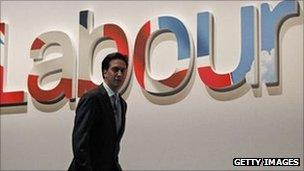Labour delegates vote to scrap shadow cabinet elections
- Published

Ed Miliband is concerned about the decline political engagement among the public
Delegates at the Labour conference have backed party leader Ed Miliband's plans to scrap elections to the shadow cabinet.
It means Mr Miliband will be able to name his own shadow ministers, ending a decades-old process which saw them chosen through a ballot of Labour MPs.
The move is part of a project, known as Refounding Labour, that Mr Miliband hopes will revitalise the party.
It will also see non-members given the right to vote in leadership elections.
Shortly before Mr Miliband became leader, the Parliamentary Labour Party (PLP) rejected an opportunity to scrap shadow cabinet elections by a margin of two to one.
But he pursued the policy once elected to the top job, arguing that shadow cabinet elections had led to candidates "jockeying for position, spending months campaigning against colleagues, and organising to get elected" - all of which was "a huge distraction".
Supporters network
The vote on Refounding Labour was overwhelming passed by delegates at the party conference in Liverpool, with 93.92% in favour and 6.08% against.
Among Constituency Labour Party members specifically, the figures were 88.3% in favour, 11.67% against, while among unions and affiliates they were 99.52% in favour, 0.48% against
Another key part of the project is to create a registered supporters scheme for members of the public who support Labour ideals but do not want to join the party itself.
Those supporters will then have the power to vote in leadership elections - at present, only MPs, MEPs, party members and members of an affiliated group, such as a trade union, can have a say.
Mr Miliband also wants to abolish the system of multiple votes in leadership elections under which individuals who are members of different affiliated organisations can vote more than once.
He wants to reform what he sees as the party's arcane procedures and make it more welcoming to outsiders, as well as forging links with other voluntary groups in the community.
But the some of the proposals have proved controversial with party members who fear it will reduce their political influence.
'Dose of medicine'
Shadow Welsh secretary Peter Hain, who has led the project, told delegates: "We have to build a people's movement for Labour in our neighbourhoods, our workplaces, that is what we mean by Refounding Labour."
He said "revitalising Labour in this way" would help "ensure that lessons leaned on the doorsteps" could be transmitted all the way up to manifesto level.
Some have expressed concern that the ideas are designed to dilute union influence, but several union representatives spoke in support of them.
Paul Kenny, of the GMB, said Refounding Labour was "a harsh but required dose of medicine", adding: "We desperately need fresh ideas and new energy."
Wendy Nichols, from Unison, said her union would support the changes "even though we have concerns", especially about having to cast a single vote on "hundreds of changes".
But she said that when union members were "under the cosh" as now - with fights on public sector cuts and pension changes" - "Refounding Labour isn't exactly top of the agenda".
'All or nothing'
Ahead of the debate on the proposals, several delegates expressed concern at the speed at which they were being pushed through.
They also objected to having to vote on the proposals as a whole rather than one by one.
Dominic Curran, of Vauxhall constituency Labour Party, said: "I'm really, really disappointed and, frankly, outraged about how Refounding Labour has been dealt with.
"It's all or nothing, conference isn't being trusted to properly deal with this document.
"I thought the party had moved on, but I'm beginning to question that."
But the calls for an extended study were rejected following an unclear show of hands, sparking cries of "Carve up!".
Earlier, Liam Byrne, chair of Labour's policy review, which is half way through its two-year task, said there was a "new centre-ground in British politics" which the party had to fight for.
"It's not a place that the party gets to pick. The centre-ground is where voters say it is.
"Our challenge now is to change and move in and say once more the centre-ground is our home-ground, and this is where we fight."
- Published19 August 2011
- Published29 March 2011
- Published27 November 2010